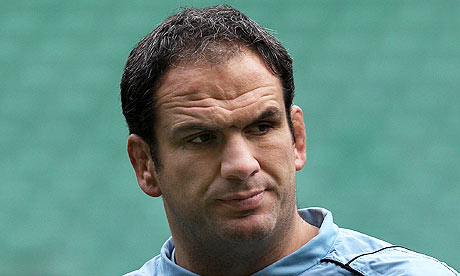
One feature of Martin Johnson's reign as England manager has been consistency in selection. There have been few examples – the Biarritz centre Ayoola Erinle's appearance against New Zealand last November being the most gla ring – of gratuitous chopping and changing. One of the reasons Andy Robinson was sacked four years ago was that his paymasters felt his selection policy was whimsical.
England have made six changes for the final match of this year's Six Nations, against France in Paris on Saturday night, having been forced to act after a poor performance at Murrayfield last weekend against the team likely to finish with the wooden spoon, Scotland. The wing Chris Ashton and centre Mike Tindall will make their first appearances in this championship. Six players, however, will have started every match this year and nine will have made four appearances.
The issue of selection has defined the Johnson era. If players are given time to prove themselves, when they are left out they tend to remain on the outside. Danny Cipriani has not featured since November 2008 and four players who made more than one start last autumn, Shane Geraghty, Dan Hipkiss, Jordan Crane and Matt Banahan, have not featured since.
If England have been accused of playing with blinkers on, the same could be said of their selectors. Johnson yesterday bemoaned the criticism his side has endured in the last two years, saying he and his coaching team had to pick up the pieces when someone was "slagged off". But was it the media who left two of his more creative players, Cipriani and Geraghty, in bits?
Geraghty has started one league match for Northampton since being dropped for the last of the November Tests and is a shadow of the player who lit up the first two months of the season. Cipriani has drifted from being the next big thing for England to a soon-to-be exile in Australia. Johnson and his coaches cannot absolve themselves from the failure to make two of England's most attacking talents cut it on the international stage.
Johnson was on firmer ground when he said that it was a misconception to say his team was "shackled", and that it was execution more than a lack of ambition that was hurting them. But there seems to be a ritualistic feel to England every time they play, a rehearsal of training ground moves with little instinct, certainly since the win against Wales, in their play.
The France coach, Marc Lièvremont, wonders why England's backs produced more for their clubs than they did for England, but England are replicating Premiership sides in their style of play and their results. How many teams do England have in the quarter-finals of the Heineken Cup?
England have scored five tries this Six Nations, four in two games at Twickenham and one in two matches away. The Premiership leaders, Leicester, have scored 23 in eight league matches at Welford Road, but only five in nine games on their travels.
Failure brings with it theories about why England are struggling. Too many foreign players in the Premiership? The fear factor generated by relegation? A fixture overload? A reluctance to give young talent its chance? There is no one overriding factor. Perhaps it comes down to a simple lack of world-class players.
Johnson the player was surrounded by exceptional quality, from Jason Robinson at full-back to Richard Hill on the flank. His resources as manager are more run-of-the-mill but has he made the most of them? If England did not lack ambition at Murrayfield, their lack of pace up front meant they were only once able to take play through more than four phases.
The pack named for Paris barely has more pace, although Lewis Moody is recalled at openside. The presence of Tindall in the centre, for the unfortunate Mathew Tait, will at least give the forwards a target. Johnson also had to shore up a defence that missed too many tackles last weekend. They got away with it against Scotland but France are not a side to turn down opportunities.
The chances are that England will finish third in the table, a place down on last year. A defining moment in 2009 came in Cardiff when, down to 14 men in the first half, with Tindall in the sin-bin, England abandoned a kicking strategy and started to run from their own half.
Riki Flutey was the inspiration and a couple of games later he wrought havoc against France. He has been a marginal figure this year. He has not been helped by Jonny Wilkinson's positioning but England's failure to take play through the phases has given him few opportunities.
France expect little from England on Saturday other than grunt, grind and honest endeavour. They will probably be right unless the men in white, in another played-led revolt, opt for a re-recording of the magic Flutey.

